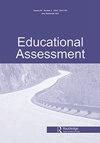从高风险考试或学校平均成绩预测高等教育的保留率
IF 2.3
Q1 EDUCATION & EDUCATIONAL RESEARCH
引用次数: 2
摘要
从中等教育到高等教育的转变因国家而异。在许多国家,中学是通过高风险的国家考试结束的,或者高风险的入学考试用于进入高等教育。在其他国家,中学平均绩点(GPA)是决定因素。在荷兰,两者都发挥了作用。利用近18万名学生的行政数据,我们调查了国家考试成绩或中学GPA是否能更好地预测大学一年级的留校率。无论是大学教育还是高等职业教育,中学GPA都能更好地预测留校率,在某种程度上,国家考试不能解释任何额外的差异。此外,对于那些考试不及格的学生,他们被中学多留了一年,一年后进入高等教育,他们在考试不及格那年的GPA仍然与通过考试并立即开始高等教育的学生一样具有预测性。另一方面,国家考试成绩对这些学生没有任何预测价值。结论是,中学GPA衡量的是学生表现的一些方面,这些方面不包括在高风险的国家考试中,但却预示着随后在高等教育中的成功。本文章由计算机程序翻译,如有差异,请以英文原文为准。
Predicting Retention in Higher Education from high-stakes Exams or School GPA
ABSTRACT The transition from secondary to tertiary education varies from country to country. In many countries, secondary school is concluded with high-stakes, national exams, or high-stakes entry tests are used for admissions to tertiary education. In other countries, secondary-school grade point average (GPA) is the determining factor. In the Netherlands, both play a role. With administrative data of close to 180,000 students, we investigated whether national exam scores or secondary school GPA was a better predictor of tertiary first-year retention. For both university education and higher professional education, secondary school GPA was the better prediction of retention, to the extent that national exams did not explain any additional variance. Moreover, for students who failed their exam, being held back by the secondary school for an additional year and entering tertiary education one year later, GPA in the year of failure remained as predictive as for students who had passed their exams and started tertiary education immediately. National exam scores, on the other hand, had no predictive value at all for these students. It is concluded that secondary school GPA measures aspects of student performance that is not included in high-stakes national exams, but that are predictive of subsequent success in tertiary education.
求助全文
通过发布文献求助,成功后即可免费获取论文全文。
去求助
来源期刊

Educational Assessment
EDUCATION & EDUCATIONAL RESEARCH-
CiteScore
3.20
自引率
6.70%
发文量
24
期刊介绍:
Educational Assessment publishes original research and scholarship on the assessment of individuals, groups, and programs in educational settings. It includes theory, methodological approaches and empirical research in the appraisal of the learning and achievement of students and teachers, young children and adults, and novices and experts. The journal reports on current large-scale testing practices, discusses alternative approaches, presents scholarship on classroom assessment practices and includes assessment topics debated at the national level. It welcomes both conceptual and empirical pieces and encourages articles that provide a strong bridge between theory and/or empirical research and the implications for educational policy and/or practice.
 求助内容:
求助内容: 应助结果提醒方式:
应助结果提醒方式:


